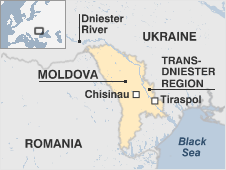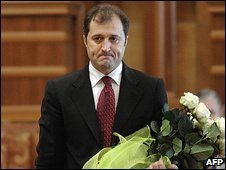 |
Sandwiched between Romania and Ukraine Moldova emerged as an independent republic following the collapse of the USSR in 1991.
The bulk of it between the rivers Dniester and Prut is made up of an area formerly known as Bessarabia. This territory was annexed by the USSR in
1940 following the carve-up of Romania in the Ribbentrop-Molotov pact between Hitler's Germany and Stalin's USSR.
Two-thirds of Moldovans are of Romanian descent the languages are virtually identical and the two countries share a common cultural heritage.
Overview
The industrialised territory to the east of the Dniester generally known as Trans-Dniester or the Dniester region was formally an autonomous area within Ukraine before 1940 when the Soviet Union combined it with Bessarabia to form the Moldavian Soviet Socialist Republic.
This area is mainly inhabited by Russian and Ukrainian speakers. As people there became increasingly alarmed at the prospect of closer ties with Romania in the tumultuous twilight years of the Soviet Union Trans-Dniester unilaterally declared independence from Moldova in 1990.
There was fierce fighting there as it tried to assert this independence following the collapse of the USSR and the declaration of Moldovan sovereignty. Hundreds died. The violence ended with the introduction of Russian peacekeepers. Trans-Dniester's independence has never been recognised and the region has existed in a state of lawless and corrupt limbo ever since.
The region reasserted its demand for independence and also expressed support for a plan ultimately to join Russia in a September 2006 referendum which was unrecognised by Chisinau and the international community.
It still houses a stockpile of old Soviet military equipment and a contingent of troops of the Russian 14th army. Withdrawal began under international agreements in 2001 but was halted when the Trans-Dniester authorities blocked the dispatch of weapons. Subsequent agreements to resume did not reach fruition as relations between Moscow and Chisinau cooled.
The Moldovan parliament granted autonomous status to the Turkic-language speaking Gagauz region in the southwest of the republic in late 1994. It has powers over its own political economic and cultural affairs.
Moldova is one of the very poorest countries in Europe and has a large foreign debt and high unemployment. Its once-flourishing wine trade has been in decline and it is heavily dependent on Russia for energy supplies.
The Russian gas supplier Gazprom cut the gas supply off at the beginning of 2006 when Moldova refused to pay twice the previous price. A temporary compromise arrangement was reached soon afterwards and the two sides agreed a new price in July 2006 with a further rise in 2007.
Gas supplies were cut off again for several weeks in January 2009 this time as a result of a dispute over prices between supplier Russia and transit country Ukraine.
Facts
- Population: 3.6 million (UN 2009)
- Capital: Chisinau
- Area: 33800 sq km (13050 sq miles)
- Major languages: Moldovan Russian
- Major religion: Christianity
- Life expectancy: 65 years (men) 72 years (women)
- Monetary unit: 1 leu = 100 bani
- Main exports: Foodstuffs animal and vegetable products textiles
- GNI per capita: US $1470 (World Bank 2008)
- Internet domain: .md
- International dialling code: +373
Leaders
President (acting): Mihai Ghimpu
Born in 1951 and a lawyer by profession Mihai Ghimpu was a founder-member of Moldova's pro-independence Popular Front in 1988 and served as a member of parliament from 1990-1998.
He went on to help form and then lead the Liberal Party and was elected to the city council in the capital Chisinau in 2007.
His nephew Dorin Chirtoaca the vice-president of the Liberal Party has been mayor of Chisinau since 2007 and played a leading role in opposing the governing Communist Party in the two parliamentary elections of 2009.
Mr Ghimpu was once again elected to parliament in April 2009 and became speaker after the July re-run of the election when the anti-Communist opposition formed a new government.
When Communist President Vladimir Voronin resigned on 11 September Mr Ghimpu succeeded him on an acting basis until parliament elects a new president.
Prime minister: Vlad Filat
The pro-Western Vlad Filat took office in September 2009 after a re-run of the April election led to the ousting of the Communists who had been in power since 2001.

Mr Filat wants Moldova to seek greater integration with Europe
|
Mr Filat described the July re-run as "a victory for truth". His Liberal Democratic Party proceeded to form a coalition with three other anti-Communist parties and the new government finally took office on 25 September after winning the approval of parliament.
However the pro-Western governing coalition only holds 53 of the 101 seats in parliament and as a three-fifths majority is required to elect a new president it is not in a position to do this without the support of at least some Communists.
Mr Filat has described integration with Europe as "an absolute priority" for his government. He has stopped short of advocating full membership of the EU but has called for Moldova to be granted special partnership status.
He was born in 1969 and studied law at the University of Iasi in Romania. On graduating he went into business.
He first entered parliament in 2005 and became the leader of the Liberal Democratic Party in 2007.
He is married with two children.
Media
Television is the most-popular medium. The public broadcaster's Moldova One channel is available nationwide. Observers say it presents a highly-favourable image of the ruling party. Russia's Channel One and Romania's Antena 1 networks are widely available.
By 2009 there were 37 terrestrial TV channels 47 radio stations and 168 cable operators according to the media regulator.
The press divides along pro-government or opposition-leaning lines. Political parties publish their own titles. Moldovan editions of Russian papers are among the best-selling publications. The reach and impact of the print media are low.
While the constitution guarantees press freedom the penal code and press laws prohibit defamation and insulting the state. Reporters Without Borders (RSF) said the media were "targeted" by demonstrators and "treated as an enemy" by security forces amid post-election protests in April 2009.
Around 700000 Moldovans were online by March 2008 (Internetworldstats). Anti-communist youth protests in April 2009 were organized with the help of social media platforms and text messaging.
The authorities in the breakaway Trans-Dniester region operate their own TV and radio outlets.
The press
- Timpul - Moldovan
- Flux - Moldovan
- Moldova Suverana - Moldovan
- Jurnal de Chisinau - Moldovan
- Kommersant Moldoviy - Russian-language
- Komsomolskaya Pravda - Russian-language
- Nezavisimaya Moldova - Russian-language
Television
- Moldova One - public operated by Teleradio-Moldova. A variant TV Moldova International is available via satellite
- Pro TV Chisinau - private; Moldovan outlet of Romania's Pro TV; Moldovan-language
Radio
- Radio Moldova - public operated by Teleradio-Moldova
- Antena C - private near-national coverage
- Vocea Basarabiei - private near-national coverage; relays output from US-backed Radio Free Europe/Radio Liberty
News agencies
- BASA-press - English-language pages
-
Moldova Azi - news portal English-language pages
AFRICA | ASIA-PACIFIC | AMERICAS | EUROPE | MIDDLEEAST | SOUTHASIA
Mauritania Mauritius Morocco Mozambique Namibia Niger Nigeria Republic-of-congo Rwanda Sao-tome-and-principe Senegal Seychelles Sierra-leone Somalia South-africa Sudan Swaziland Tanzania The-gambia Togo Tunisia Uganda zambia Zimbabwe Australia Brunei Burma Cambodia China East-timor Fiji Indonesia Japan Kazakhstan Kiribati Kyrgyzstan Laos Malaysia Marshall-islands Micronesia Mongolia Nauru New-zealand North-korea Palau Papua-new-guinea Samoa Singapore Solomon-islands South-korea Taiwan Tajikistan Thailand The-philippines Tonga Turkmenistan Tuvalu Uzbekistan Vanuatu Vietnam Antigua-and-barbuda Argentina Bahamas Barbados Belize Bolivia Brazil Canada Chile Colombia Costa-rica Cuba Dominica Dominican-republic Ecuador El-salvador Grenada Guatemala GuyanaHaiti Honduras Jamaica Mexico Nicaragua Panama Paraguay Peru St-kitts-and-nevis St-lucia St-vincent-and-the-grenadines Suriname Trinidad-and-tobago United-states-of-america Uruguay Venezuela Albania Andorra Armenia Austria Azerbaijan Belarus Belgium Bosnia-hercegovina Bulgaria Croatia Cyprus Czech-republic Denmark Estonia Finland France Georgia Germany Greece Hungary Iceland Ireland Italy Latvia Liechtenstein Lithuania Luxembourg Macedonia Malta Moldova Monaco Montenegro Norway Poland Portugal Russia San-marino Serbia Slovakia Slovenia Spain Sweden Switzerland The-netherlands Turkey Ukraine United-kingdom Vatican Algeria Egypt Iran Iraq Israel-and-palestinian-territories Jordan Kuwait Lebanon Libya Mauritania Oman Saudi-arabia Sudan Syria Tunisia United-arab-emirates Yemen Afghanistan Bangladesh Bhutan India Nepal Pakistan Sri-Lanka The-Maldives

